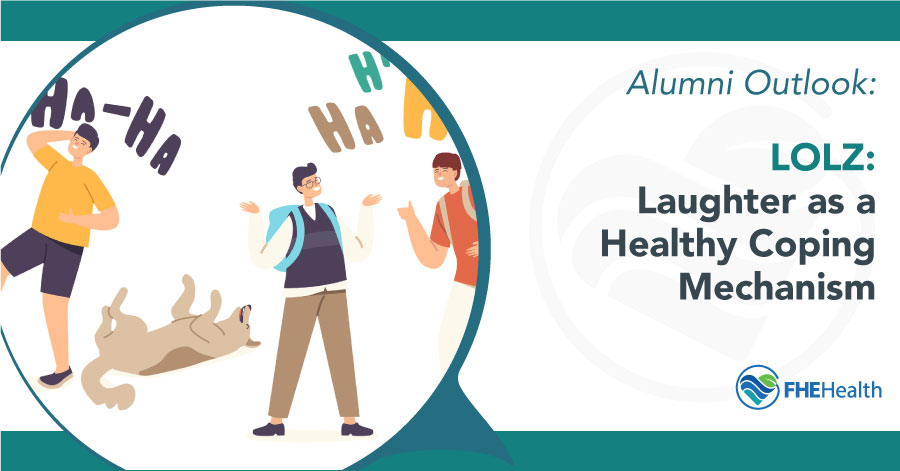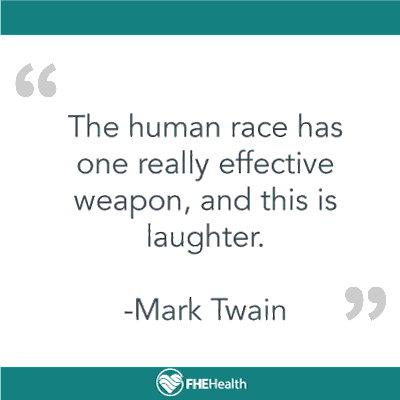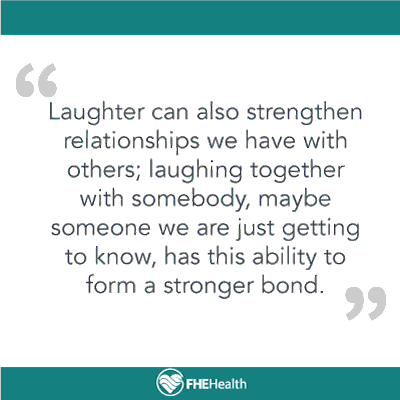
There are not many things better in life than witnessing something so comical that it produces a guttural belly laugh. Why is it so great? Laughing naturally releases endorphins into your brain. Endorphins are the ‘feel good’ chemical that gets spread in our brains when we enjoy something.
Think about eating that first bite of a sky-high cake; you can feel the enjoyment from head to toe when it’s delicious. That’s because your brain releases endorphins from the experience.
 Do you know what else produces endorphins? Drugs and alcohol release a lot of endorphins. Way too many in fact. Notice with laughter or a piece of cake that the endorphins are produced naturally, at a healthy rate.
Do you know what else produces endorphins? Drugs and alcohol release a lot of endorphins. Way too many in fact. Notice with laughter or a piece of cake that the endorphins are produced naturally, at a healthy rate.
Drugs and alcohol can produce endorphins x1000, which is why drugs can cause euphoria. That is also the cause of dependency. Once you get reliant on those huge endorphin boosts, being without them can cause people to be miserable.
In early recovery, chances are our endorphin receptors are in rough shape, which can lead to depression and anxiety. This is why inpatient treatment is nearly required for the first month or two in recovery. The first reaction we addicts have when we are not far from our last high is that drugs and/or alcohol will make us feel ‘good’ again.
Once you leave treatment, it can still be a slow climb; there can and will be down days.
Mark Twain once said, “The human race has one really effective weapon, and this is laughter.”
What Is Laughter
Encyclopedia Britannica defines laughter as ‘a motor reflex produced by the coordinated contraction of 15 facial muscles in a stereotyped pattern and accompanied by altered breathing.’
When you break down and analyze laughter, it’s an odd sensation that we have. It’s a subconscious reaction; if I asked you to laugh on the spot, you could probably do a decent fake laugh, but it wouldn’t feel the same.
From my research, I have come across many body parts that are affected by laughter. Still, I’m not going to identify them and act like I know what they all are (do you know what a zygomatic major muscle or an epiglottis is? Me either.)
More or less, your body starts doing some majorly involuntary and uncommon things once the laughter has struck you. We stop breathing, then need big gasps of air, our faces turn red, and the tear ducts can even become activated from gyrating so hard from laughter. It’s great!
Health Benefits of Laughing
 As strange as laughing is when you strictly look at our body’s reaction to it, we all know how enjoyable it is to laugh and how good it feels. Laughing is legitimately good for you; it is excellent for coping with stress or depression.
As strange as laughing is when you strictly look at our body’s reaction to it, we all know how enjoyable it is to laugh and how good it feels. Laughing is legitimately good for you; it is excellent for coping with stress or depression.
Some benefits include:
Relaxing the entire body: A solid laugh will relieve physical tension and stress; it can even leave your muscles relaxed for up to 45 minutes afterward.
A release of endorphins: as previously discussed, laughter produces endorphins which are the feel-good chemicals in the brain. Natural releases of endorphins are an excellent thing to have.
Beneficial for the heart: Laughter will increase blood flow and improve the function of your blood vessels, which is very helpful in protecting yourself from heart disease.
Boost the immune system: Along with decreased stress hormones, laughing can increase immune cells, which are vital in fighting against antibodies.
I am sure you can look back to a time when you were in a dark/bad place, and once something made you laugh, you could tangibly feel the relief that it provided right after.
Laughter can also strengthen relationships we have with others; laughing together with somebody, maybe someone we are just getting to know has this ability to form a stronger bond. Having a laughing fit alone while watching something is one thing, but isn’t it better to laugh along with someone else?
Science says our brains even have a ‘detector’ for laughter that can cause us to laugh just because someone close to us is, which explains the contagious laughter theory.
Finding Time To Laugh
In my seven years in recovery, I have found great freedom from not taking myself or my circumstances so seriously. I’m talking about my day-to-day life; if you experience something traumatic, that is to be taken seriously.
Being less serious allows room for me to laugh at myself or the situations I find myself in, and as we have covered, finding space to laugh has so many benefits and beats the hell out of sulking and being in our own head.
Laughing is basically like medicine; I’ve had so many moments in my life where I was having a crummy, funky day, and at some point, I would come across a video on my phone or something on the TV that I found funny and could feel my entire body get lighter from allowing myself to chuckle at it.
There is always that weird side of us while being angry or upset that wants us to stay in that funk. Bring some awareness to that next time it happens and pop on a favorite stand-up comedian or a favorite sitcom; you will be amazed at the relief you can feel from something so simple and easy to access.
Life will always have ups and downs; it’s an unavoidable truth to being alive. The best thing to do is prepare for when things may be going downward to soften the blow. Having the simple tool of laughing in your tool belt can genuinely pull you out of the dark at the snap of a finger.






